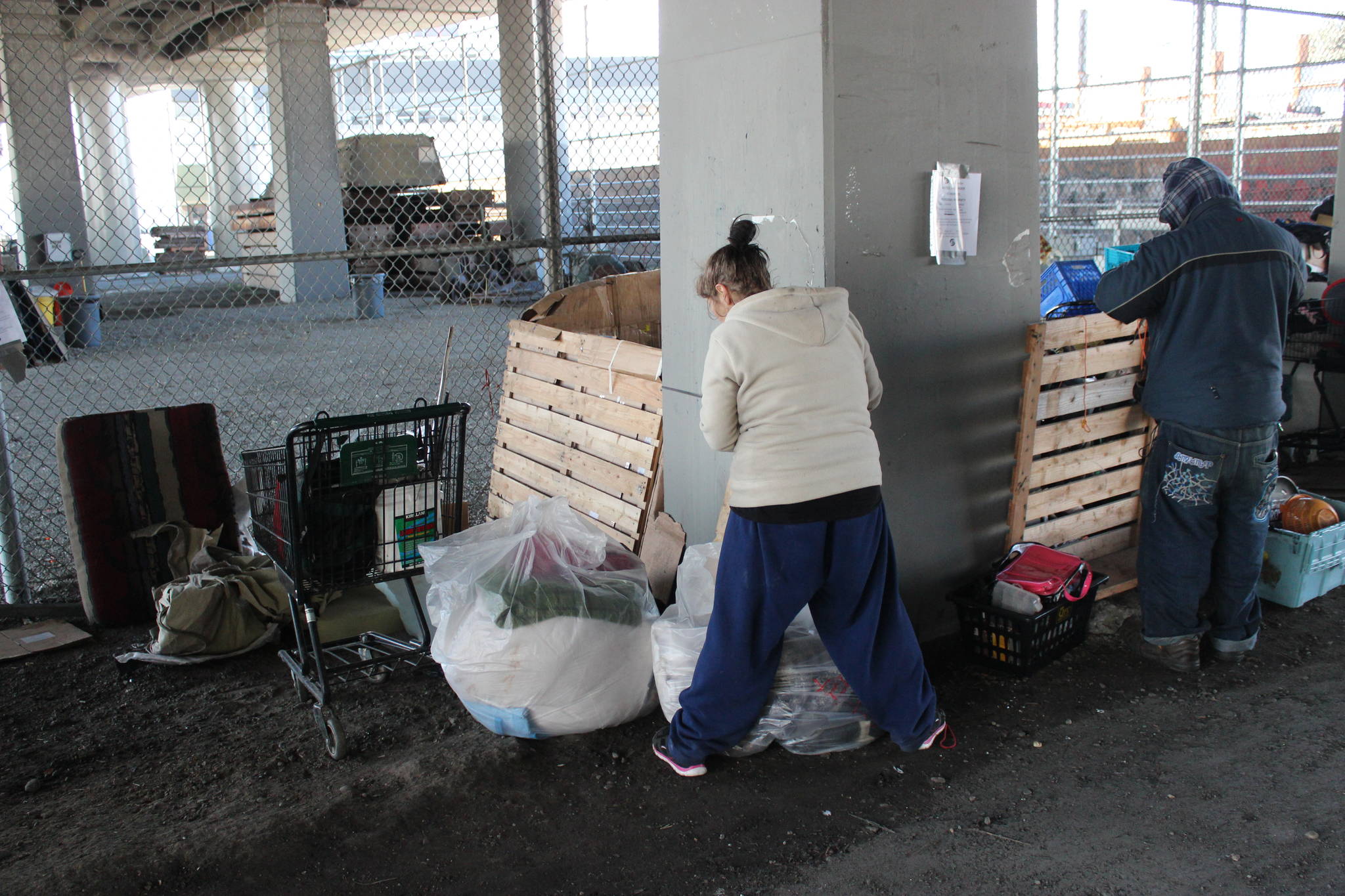At a Town Hall Seattle panel on homelessness this morning, commenter Melody Paxton spoke her mind. “I don’t personally feel like I have a voice or the people who live in my city have a voice,” she said. “There’s no one listening to our perspective.”
A “Real Estate Warrior” for Windermere Estates in Belltown, Paxton told the crowd of a couple hundred people that she’s been traumatized by the proliferation of visible poverty across Seattle. As she spoke, Paxton held up a printed-out poster showing a photo of a couple tents under a bridge. “This is my front door, every day, this is what I look at,” she said. “I feel like I’m living in a war zone.” The solution, she said, is clear: “We have to outlaw camping on public sidewalks and panhandling so we don’t have to see this anymore.”
Melanie Paxton, holding blown-up photo of tents by her condo: "Houston outlawed camping and panhandling. That’s what we have to do." pic.twitter.com/zRlGk2VlAb
— Erica C. Barnett (@ericacbarnett) April 18, 2017
Barbara Poppe, former director of the U.S. Interagency Council on Homelessness and consultant to Seattle Mayor Ed Murray, sat on the stage in a tall chair and listened as Paxton spoke. When moderator and KIRO radio host Dave Ross asked Poppe and her co-panelists (the heads of several local social services agencies) why none of them seemed to agree with Paxton’s proposal, Poppe replied thus:
“Criminalizing the act of homelessness, because there are no other places for people to go, is really a violation of our basic human rights.” At this, the crowd broke into applause. “And beyond the human rights aspect…there is a lot of evidence that it [exacerbates homelessness], because you’re arresting people, giving them a criminal history. What happens when you get a criminal history? You can’t get a job, you can’t get housing.”
But Paxton wasn’t the only person in the room who’d reached the figurative end of her rope. Bill Barnes, a resident and City Light employee, described how he’s become cynical. “Maybe the solution isn’t to make camping on the street illegal,” he said. “But there’s illegal activity going on now—drug activity, prostitution, public urination and defecation, littering, they’re blocking sidewalks. The police do nothing for any of this. They do nothing…I don’t know what to do. I call. I email the council. It does nothing.”
Tina Davis, a manager for an international real estate firm, described how last year at one of the highrises she manages near downtown, “We hired a security guard to be in our stairwell because our tenants were complaining” about homeless people getting in. “We had to eliminate 34 [homeless people] in one week out of one stairwell,” she said. “People that were sleeping, coming in there, doing drugs. 34 in one week. And that was a year ago, and now it’s gotten worse.”
As we’ve reported in the past, Seattle has a history of disconnect and antagonism between neighborhood homeowners and city hall. Seattle’s manifestly inadequate homelessness response fits neatly into the mold of that pre-existing argument: city bureaucrats are just as out-of-touch about the crackhead shooting up in front of your house as they are about fixing cracked sidewalks in Greenwood or potholes in Magnolia.
With bracing honesty, Barnes described the psychological process that created this growing pustule of resentment. “What I don’t like about [this situation] the most,” he said, “is I am becoming a NIMBY. I was sympathetic [to homeless people] for a long time. Then after a while, that sympathy, that sadness turns to anger. And that anger says, ‘OK, I can’t solve this problem. I’m getting older faster than this is getting better. So you know what? I don’t want it here. I want to be able to walk out my door and not hate what I see.’”
Paxton's husband, Ben Barnes: "I'm becoming a NIIMBY… I don’t want it here. I want to walk out my door and not hate what I see." pic.twitter.com/GmonQHlvIG
— Erica C. Barnett (@ericacbarnett) April 18, 2017
Another panelist, King County Department of Community and Health Services director Adrienne Quinn, responded to Barnes’ testimony. “All of us are disgusted by what we see,” she said. This specter of squalor and human suffering raises questions in the soul that are difficult to face. “What kind of society do we live in,” she asked, “where we’re willing to step over people” who are asleep on the sidewalk?
The human casualties along Seattle’s sidewalks and underpasses are a heavy emotional weight to behold. (Not as heavy as the literal and figurative weights homeless people must carry, but nonetheless powerful enough to motivate behavior.) So it makes sense that many Seattleites have developed emotional strategies for ignoring and repressing that spectacle, and the indictment of themselves and our society it implies. Beneath the anger lies despair and shame.
“It’s time that we don’t blame the people who are homeless,” Quinn told her audience, voicing an imperative that seems to be as elusive as it is obvious.
cjaywork@seattleweekly.com








